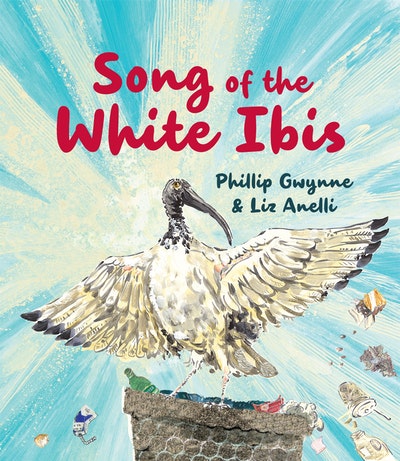‘Bin Chicken, Tip Turkey, Picnic Pirate’: these three rather derogatory names appear on every double page spread throughout this humorous picture book. Phillip Gwynne and Liz Anelli have taken a creative look at one of Australia’s most maligned birds, the White Ibis.
Many city dwellers will be familiar with the sight of these large birds scavenging in bins and dumpsters generally making a mess and a nuisance of themselves. Few however know the White Ibis story and why they have earnt their unflattering nicknames.
We learn Threskiornis Molucca, to give them their scientific name, is related to the Sacred Ibis of Egypt and to Thoth, the Egyptian God of science, writing, magic, and the moon. So how did this bird fall from this God-like status to earning its current low esteem?
As we move through the book, we learn that the White Ibis has been in Australia for a very long time and had been a farmer’s friend having the ability to aerate the soil while seeking worms and eating locusts during plagues. They lived in wetlands eating mussels and crayfish but gradually their home had been taken away by human development, dams, roads, houses and more but they still needed to eat and to live, so what better way than off what humans so casually throw away? This leads into the White Ibis’ wise words, ‘Renew, recycle and replenish because one day we might all be Bin Chickens.’
Liz Anelli’s colourful wide double page spread illustrations are integral to showing the changes that have occurred to the White Ibis’ environment. At first, we see them in clean natural wetlands or digging in open farmland but gradually we see the encroachment of humans, cities, power lines and hordes of humans appearing. The reader is shown the White Ibis’ new reality—not only life scavenging in the waste and discards of humans but their somewhat incomprehensible fame.
A book with a strong, if somewhat different environmental message.

